District of Columbia
Thousands attend March for Our Lives rally in D.C.
Sunday marks six years since the Pulse nightclub massacre
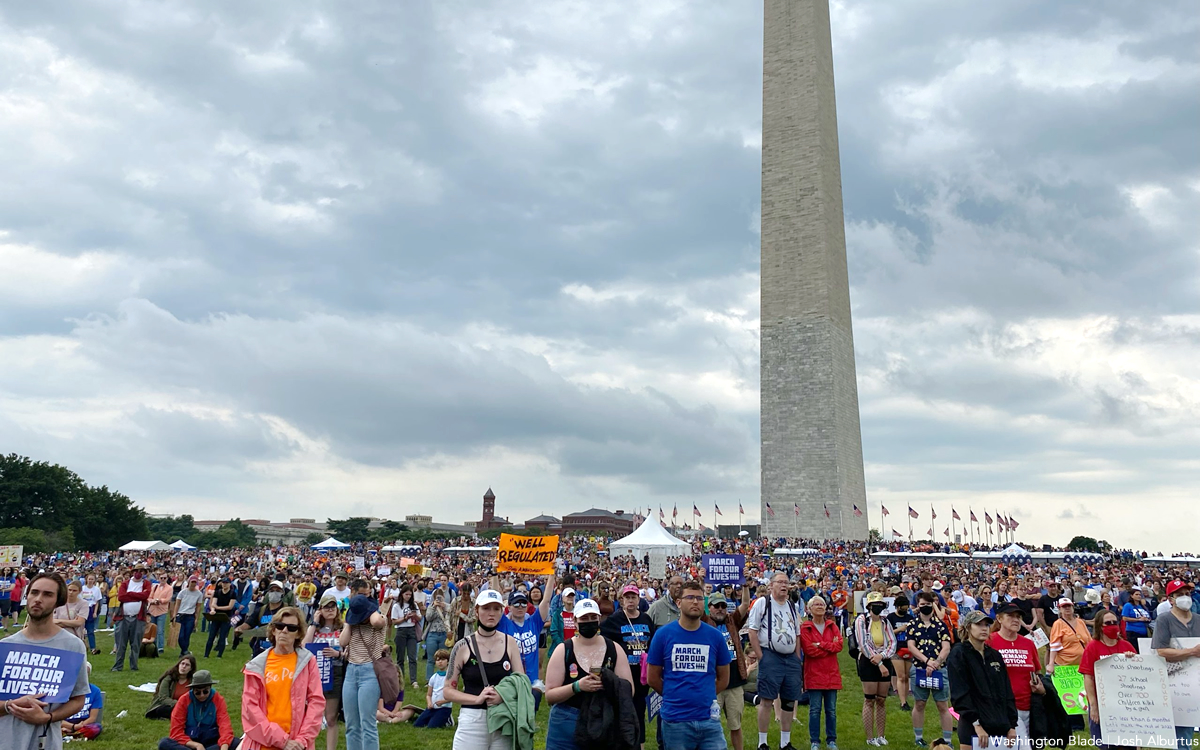
On the night of June 12, 2016, 49 people were killed and 53 were injured in a mass shooting at the Pulse nightclub in Orlando, Fla. The shooting has since remained one of the deadliest mass shootings in U.S. history.
Six years later, efforts to curb gun violence in America and halt the country’s epidemic of mass shootings have reignited in the wake of more recent mass shootings.
Just before noon on Saturday thousands of people carrying signs and clad in anti-gun-violence clothing flooded the north lawn of the Washington Monument.
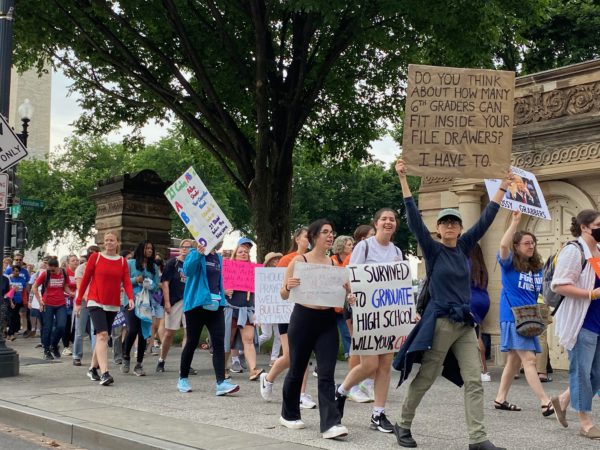
(Washington Blade photo by Josh Alburtus)
One of those in the crowd was Jessica Mahoney, a young activist with ties to a national past littered with gun violence.
“My close family is from Sandy Hook and, as the sign references, I used this sign four years ago,” Mahoney said. “This has been a very personal issue for me since 2012 when I had to spend over an hour wondering if my cousins were alive or not. I just feel like it’s so important that people are out here that haven’t been personally touched by the issue because I just think that shows that there’s a real movement behind what’s going on.”
Mahoney and her fellow protesters in the crowd were some of the hundreds of thousands more protestors who marched in different cities across the country on that day calling on state and federal lawmakers to pass legislation reforming the nation’s gun laws.
The marches, organized in large part by the youth-led gun violence prevention organization March for Our Lives, were triggered by a sustained national outcry for action following the latest mass shootings at Robb Elementary School in Uvalde, Texas, and a Tops Friendly Market in Buffalo, N.Y, both in late May. The organization held similar nationwide rallies in 2018 following the Parkland school shooting that led to the group’s inception.
Mahoney described her feelings about having to return to another rally four years later in an effort to address the same issue.
“It’s frustrating and a bit maddening at times to be honest that we still have to do this,” Mahoney said. “But it just seems like there’s more energy every time and so I think that I’m also hopeful about it.”
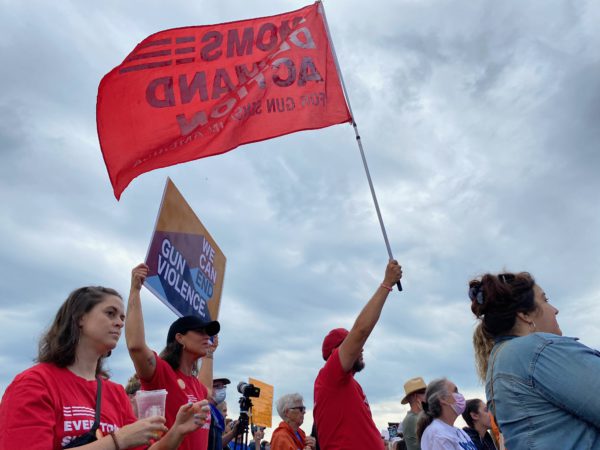
The issue has been one plaguing Americans in various settings and from various walks of life and has affected those across a spectrum of identities, including the LGBTQ community.
Marking the sixth anniversary of the Pulse shooting in Orlando, the Human Rights Campaign released a statement the day before the March for Our Lives rally.
“Gun violence remains an LGBTQ+ issue, with three-fourths of homicides against transgender people — including nearly eight in 10 homicides of Black trans women — involving a gun,” Interim HRC President Joni Madison said in the statement. “Compounding this tragedy is the fact that in the six years since Pulse, we have been unable to advance meaningful federal gun reform legislation.”
But in an effort to prevent future mass killings like those in Parkland, Uvalde, Buffalo and Orlando, prominent activists have since brought a spotlight to the issue of gun violence in America. Many such activists descended on the grounds of the Washington Monument on Saturday to speak to those gathered and amplify their message.
David Hogg, a survivor of the mass shooting on February 14, 2018, at Marjory Stoneman Douglas High School in Parkland, Fla., and a founder and board member of March for Our Lives, spoke to the crowd.
“We need to stop these shooters before they get on campus and stop endangering the lives of our first responders, our students, our teachers because people on Capitol Hill don’t want to do their job and protect us,” Hogg said.
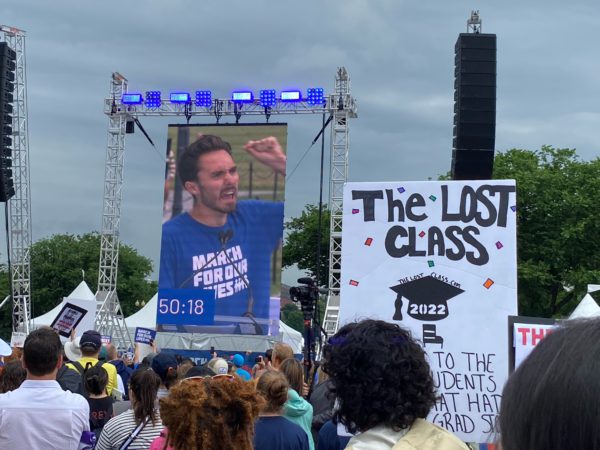
(Washington Blade photo by Josh Alburtus)
Alongside Hogg were a number of other activists and politicians who shared the goal of reducing gun violence in America, including D.C. Mayor Muriel Bowser and U.S. Rep. Cori Bush (D-Mo.).
Bush described her own proximity to gun violence in calling for action, sharing with the crowd her past escape from such as she ran from an abusive partner who kept firearms in their home.
“When I turned back for a moment, because, ‘Why isn’t he chasing me?’” Bush said. “I turned back, and I saw him standing still, ‘Why is he standing still?’ Next thing I knew, I heard shots.”
Bush believed the near-death experience to be “completely preventable.”
“Closing the boyfriend loophole could’ve saved me from a near-lethal encounter with gun violence,” Bush said. “A red flag law could’ve saved me from a nearly lethal encounter with gun violence.”
Hogg and others took aim at counterarguments from pro-gun entities that have advocated for mental health support rather than gun reform to solve the problem.
“We also must address the fact that mental health does have a role to play in stopping gun violence, but that racism is not a mental illness,” Hogg said. “Hatred, racism, radicalization, xenophobia are not mental illnesses.”
But even at an event meant to highlight what gatherers felt was a need to curb the nation’s scourge of gun violence, the specter of fear and violence remained ubiquitous.
During a moment of silence for the victims of America’s gun violence, a man toward the front of the crowd began to shout and attempted to breach the event’s main stage. A source close to the stage told the Washington Blade that the man threw a megaphone into the crowd while shouting, “I am God.”
Those assembled feared the worst. Due to the size of the crowd that had assembled, rallygoers across the lawn perceived the disturbance to be an active gun threat. Hundreds dropped flat to the ground while others ran from the stage in an attempt to escape the potential violence.
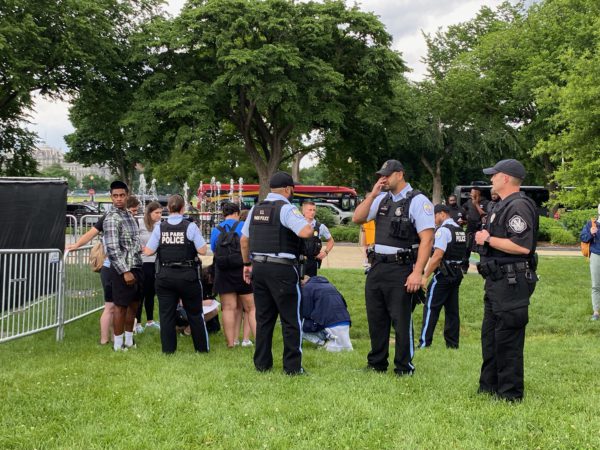
After organizers and police were able to apprehend the disruptor, rally organizers attempted to reconvene the frightened crowd and push forward.
“Do not run, freeze, do not run,” an organizer said over the sounds of emerging police sirens. “There is no issue here, do not run.”
But the moment of fear clung to many who were present.
Rallygoer Kirsten Hiera witnessed the moment of mass confusion but was unable to flee the scene despite her own fear.
“I was scared but I didn’t want to run away because I’m with someone who’s elderly and I didn’t want to have her be abandoned,” Hiera said. “I felt scared and confused but I didn’t want to abandon my friend.”
As those gathered began to tepidly rise and return to the stage, the organizer proceeded to draw attention back to the focus of the rally, leading a chant exclaiming peace to be a lifestyle.
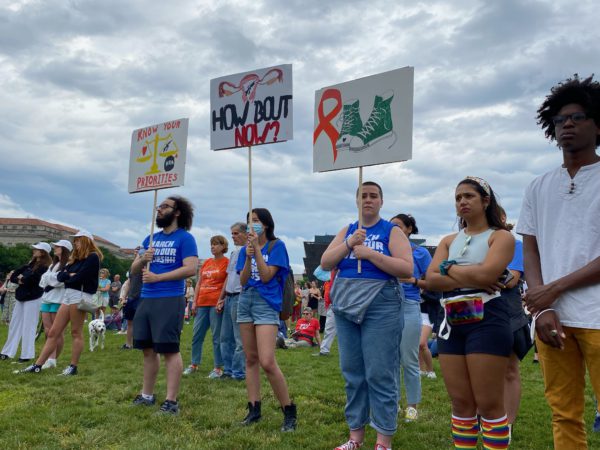
Exiting the stage toward the end of the rally after the crowd had reconvened, the organizer left them with advice that touched to the core of the movement’s mission — one that, in the wake of tens of thousands of gun deaths in shootings like Orlando, organizers like Hogg have described as not pro-gun or anti-gun, but pro-peace.
“The other thing that I want to say is let’s not give into the hate,” she said. “Let’s not give into the hate. There’s more people who are about love than there is that is about hate.”
District of Columbia
D.C. police arrest man for burglary at gay bar Spark Social House
Suspect ID’d from images captured by Spark Social House security cameras

D.C. police on Feb. 18 arrested a 63-year-old man “of no fixed address” for allegedly stealing cash from the registers at the gay bar Spark Social House after unlawfully entering the bar at 2009 14th St., N.W., around 12:04 a.m. after it had closed for business, according to a police incident report.
“Later that day officers canvassing for the suspect located him nearby,” a separate police statement says. “63-year-old Tony Jones of no fixed address was arrested and charged with Burglary II,” the statement says.
The police incident report states that the bar’s owner, Nick Tsusaki, told police investigators that the bar’s security cameras captured the image of a man who has frequently visited the bar and was believed to be homeless.
“Once inside, the defendant was observed via the establishment’s security cameras opening the cash register, removing U.S. currency, and placing the currency into the left front pocket of his jacket,” the report says.
Tsusaki told the Washington Blade that he and Spark’s employees have allowed Jones to enter the bar many times since it opened last year to use the bathroom in a gesture of compassion knowing he was homeless. Tsusaki said he is not aware of Jones ever having purchased anything during his visits.
According to Tsusaki, Spark closed for business at around 10:30 p.m. on the night of the incident at which time an employee did not properly lock the front entrance door. He said no employees or customers were present when the security cameras show Jones entering Spark through the front door around 12:04 a.m.
Tsusaki said the security camera images show Jones had been inside Spark for about three hours on the night of the burglary and show him taking cash out of two cash registers. He took a total of $300, Tsusaki said.
When Tsusaki and Spark employees arrived at the bar later in the day and discovered the cash was missing from the registers they immediately called police, Tsusaki told the Blade. Knowing that Jones often hung out along the 2000 block of 14th Street where Spark is located, Tsusaki said he went outside to look for him and saw him across the street and pointed Jones out to police, who then placed him under arrest.
A police arrest affidavit filed in court states that at the time they arrested him police found the stolen cash inside the pocket of the jacket Jones was wearing. It says after taking him into police custody officers found a powdered substance in a Ziploc bag also in Jones’s possession that tested positive for cocaine, resulting in him being charged with cocaine possession in addition to the burglary charge.
D.C. Superior Court records show a judge ordered Jones held in preventive detention at a Feb. 19 presentment hearing. The judge then scheduled a preliminary hearing for the case on Feb. 20, the outcome of which couldn’t immediately be obtained.
District of Columbia
Judge rescinds order against activist in Capital Pride lawsuit
Darren Pasha accused of stalking organization staff, board members, volunteers

A D.C. Superior Court judge on Feb.18 agreed to rescind his earlier ruling declaring local gay activist Darren Pasha in default for failing to attend a virtual court hearing regarding an anti-stalking lawsuit brought against him by the Capital Pride Alliance, the group that organizes D.C.’s annual Pride events.
The Capital Pride lawsuit, initially filed on Oct. 27, 2025, accuses Pasha of engaging in a year-long “course of conduct” of “harassment, intimidation, threats, manipulation, and coercive behavior” targeting Capital Pride staff, board members, and volunteers.
In his own court filings without retaining an attorney, Pasha has strongly denied the stalking related allegations against him, saying “no credible or admissible evidence has been provided” to show he engaged in any wrongdoing.
Judge Robert D. Okum nevertheless on Feb. 6 approved a temporary stay-away order requiring Pasha to stay at least 100 feet away from Capital Pride’s staff, volunteers, and board members until the time of a follow-up court hearing scheduled for April 17. He reduced the stay-away distance from 200 yards as requested by Capital Pride.
In his two-page order issued on Feb. 18, Okun stated that Pasha explained that he was involved in a scooter accident in which he was injured and his phone was damaged, preventing him from joining the Feb. 6 court hearing.
“Therefore, the court finds there is a good cause for vacating the default,” Okun states in his order.
At the time he initially approved the default order at the Feb. 6 hearing that Pasha didn’t attend, Okun scheduled an April 17 ex parte proof hearing in which Capital Pride could have requested a ruling in its favor seeking a permanent anti-stalking order against Pasha.
In his Feb. 18 ruling rescinding the default order Okun changed the April 17 ex parte proof hearing to an initial scheduling conference hearing in which a decision on the outcome of the case is not likely to happen.
In addition, he agreed to consider Pasha’s call for a jury trial and gave Capital Pride 14 days to contest that request. The Capital Pride lawsuit initially called for a non-jury trial by judge.
One request by Pasha that Okum denied was a call for him to order Capital Pride to stop its staff or volunteers from posting information about the lawsuit on social media. Pasha has said the D.C.-based online blog called DC Homos, which Pasha claims is operated by someone associated with Capital Pride, has been posting articles portraying him in a negative light and subjecting him to highly negative publicity.
“The defendant has not set forth a sufficient basis for the court to restrict the plaintiff’s social media postings, and the court therefore will deny the defendant’s request in his social media praecipe,” Okun states in his order.
A praecipe is a formal written document requesting action by a court.
Pasha called the order a positive development in his favor. He said he plans to file another motion with more information about what he calls the unfair and defamatory reports about him related to the lawsuit by DC Homos, with a call for the judge to reverse his decision not to order Capital Pride to stop social media postings about the lawsuit.
Pasha points to a video interview on the LGBTQ Team Rayceen broadcast, a link to which he sent to the Washington Blade, in which DC Homos operator Jose Romero acknowledged his association with Capital Pride Alliance.
Capital Pride Executive Director Ryan Bos didn’t immediately respond to a message from the Blade asking whether Romero was a volunteer or employee with Capital Pride.
Pasha also said he believes the latest order has the effect of rescinding the temporary stay away order against him approved by Okun in his earlier ruling, even though Okun makes no mention of the stay away order in his latest ruling. Capital Pride attorney Nick Harrison told the Blade the stay away order “remains in full force and effect.”
Harrison said Capital Pride has no further comment on the lawsuit.
District of Columbia
Trans activists arrested outside HHS headquarters in D.C.
Protesters demonstrated directive against gender-affirming care

Authorities on Tuesday arrested 24 activists outside the U.S. Department of Health and Human Services headquarters in D.C.
The Gender Liberation Movement, a national organization that uses direct action, media engagement, and policy advocacy to defend bodily autonomy and self-determination, organized the protest in which more than 50 activists participated. Organizers said the action was a response to changes in federal policy mandated by Executive Order 14187, titled “Protecting Children from Chemical and Surgical Mutilation.”
The order directs federal agencies and programs to work toward “significantly limiting youth access to gender-affirming care nationwide,” according to KFF, a nonpartisan, nonprofit organization that provides independent, fact-based information on national health issues. The executive order also includes claims about gender-affirming care and transgender youth that critics have described as misinformation.
Members of ACT UP NY and ACT UP Pittsburgh also participated in the demonstration, which took place on the final day of the public comment period for proposed federal rules that would restrict access to gender-affirming care.
Demonstrators blocked the building’s main entrance, holding a banner reading “HANDS OFF OUR ‘MONES,” while chanting, “HHS—RFK—TRANS YOUTH ARE NO DEBATE” and “NO HATE—NO FEAR—TRANS YOUTH ARE WELCOME HERE.”
“We want trans youth and their loving families to know that we see them, we cherish them, and we won’t let these attacks go on without a fight,” said GLM co-founder Raquel Willis. “We also want all Americans to understand that Trump, RFK, and their HHS won’t stop at trying to block care for trans youth — they’re coming for trans adults, for those who need treatment from insulin to SSRIs, and all those already failed by a broken health insurance system.”
“It is shameful and intentional that this administration is pitting communities against one another by weaponizing Medicaid funding to strip care from trans youth. This has nothing to do with protecting health and everything to do with political distraction,” added GLM co-founder Eliel Cruz. “They are targeting young people to deflect from their failure to deliver for working families across the country. Instead of restricting care, we should be expanding it. Healthcare is a human right, and it must be accessible to every person — without cost or exception.”

Despite HHS’s efforts to restrict gender-affirming care for trans youth, major medical associations — including the American Medical Association, the American Academy of Pediatrics, and the Endocrine Society — continue to regard such care as evidence-based treatment. Gender-affirming care can include psychotherapy, social support, and, when clinically appropriate, puberty blockers and hormone therapy.
The protest comes amid broader shifts in access to care nationwide.
NYU Langone Health recently announced it will stop providing transition-related medical care to minors and will no longer accept new patients into its Transgender Youth Health Program following President Donald Trump’s January 2025 executive order targeting trans healthcare.


















